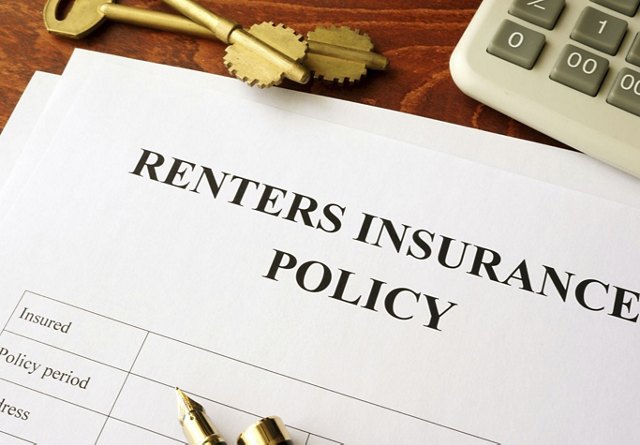What You Can Expect from a Renters Insurance Policy
You’ve signed a lease for a new apartment, and now it’s time to find a renters insurance policy that best suits your needs. Like most types of insurance, the hope is that you won’t actually have to use the coverages that are available. However, all it takes is a fire breaking out or someone falling and breaking their arm in your apartment and you could be looking at a significant out-of-the-blue financial burden. Having a solid renters insurance policy in place will protect you from the unexpected.
What Exactly is Renters Insurance?
Renters insurance covers any personal items within your rental property when they’re damaged or lost by a covered event, such as a fire or theft. Any lost or damaged property is reimbursed at either its actual cash value (accounts for depreciation) or replacement cost (does not account for depreciation). The type of policy you purchase will determine the reimbursement rate. Renters insurance also offers liability protection and additional living expenses.
What Does Renters Insurance Cover?
Coverages may vary depending on which insurance company you select, but you can expect damage from the following events to be covered:
- Hail
- Fire
- Windstorm
- Lightning
- Vandalism
- Theft
- Riot or civil commotion
- Falling objects
Your policy will also cover accidental injuries to other people and any damages to their property while visiting your apartment. If someone files suit against you for either personal injury to damage to their property, your liability coverage will provide legal representation and will cover the amount of awarded damages to the other party up to your coverage limit.
If damage is severe enough to deem your apartment uninhabitable, additional coverage for living expenses will pay for lodging, meals and other necessary costs while it’s repaired.
Is Renters Insurance Required by Law?
While it’s not a legal requirement, it’s not unusual for landlords to require tenants to purchase renters insurance. A liability limit will be defined in the lease, typically around $100,000. In addition, a landlord may ask that renters include specific endorsements on their policy, such as flood or earthquake insurance. Endorsement requirements are generally based on location. Before moving into a new apartment, review the lease carefully to see what types of insurance requirements are in place.
If’s there no requirement in your lease, it may seem like a cost-saving move to go without renters insurance. However, doing so comes with a certain level of risk. Accidents can occur at any time and the personal cost of replacing your household items or paying someone’s hospital bills out of pocket certainly outweighs the premiums for any renters insurance policy.
How Much Does Renters Insurance Cost?
Chances are your renters insurance will cost less than your local gym membership. Commonly ranging from $5 to $30 per month, renters insurance will protect your personal belongings and provide liability protection at a very affordable rate. According to ValuePenguin, the national average cost of renters insurance in 2019 was $16 per month. You can decide whether the price is worth it, but that’s a small amount to pay for peace of mind.
What are Your Options for Renters Insurance?
Mainstream insurance companies like Allstate and Progressive will have a renters insurance extension. You can contact your automotive or homeowners insurance provider to get a renters insurance quote and to see if they offer an opportunity to bundle. If you aren’t sold on the rate, consider external carriers. Lemonade, Young Alfred and Jetty are all listed in the top five of insurance companies who provide rental coverage by consumersadvocate.org. No matter where you look, you’ll likely find an affordable premium and a policy that provides ample protection for both you and your apartment.
Renters may also be interested in reading…
- More Space in Your Little Place: Decorating and Storage Ideas for a Studio Apartment
- Here Are Ways You and Your Apartment Neighbors Can Make Your Fashion Choices Green
- 8 Things to Never Put in Your Apartment’s Garbage Disposal
The information presented on or through this Website is made available solely for general information purposes. We do not warrant the accuracy, completeness, or usefulness of this information. Any reliance you place on such information is strictly at your own risk. We disclaim all liability and responsibility arising from any reliance placed on such materials by you or any other visitor to this Website, or by anyone who may be informed of any of its contents. Any reference to amenities, services, rules, policies, or procedures at a Greystar apartment community is general in nature, and each Greystar apartment community may have amenities, services, rules, policies, and procedures that differ from those referenced on this Website. Please consult with your Greystar apartment community for the exact amenities, services, rules, policies, or procedures applicable.
This Website may include content provided by third parties, including materials provided by other users, bloggers, and third-party licensors, syndicators, aggregators, and/or reporting services. All statements and/or opinions expressed in these materials, and all articles and responses to questions and other content, other than the content provided by Greystar, are solely the opinions and the responsibility of the person or entity providing those materials. These materials do not necessarily reflect the opinion of Greystar. We are not responsible, or liable to you or any third party, for the content or accuracy of any materials provided by any third parties.



